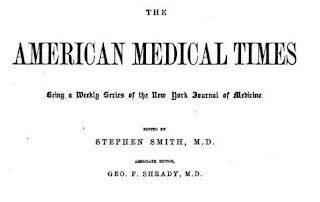 I have mentioned before that I really enjoy reading Civil War-era medical journals. I recently secured an original copy of the June 1, 1861, issue of the American Medical Times, and thought I'd share some of the highlights and interesting excerpts; they are all the more interesting due to its being a (very) early war issue:
I have mentioned before that I really enjoy reading Civil War-era medical journals. I recently secured an original copy of the June 1, 1861, issue of the American Medical Times, and thought I'd share some of the highlights and interesting excerpts; they are all the more interesting due to its being a (very) early war issue:1) "Contributions to Military Surgery" by Zina Pitcher, M.D. - Zina Pitcher (1797-1872) was a noted surgeon of the era and a distinguished citizen of the State of Michigan. He served 15 years in the United States Army, was president of the American Medical Association, and a two-time mayor of Detroit. In his essay, Pitcher commented on the "literary sterility" on the part of the military when it came to sharing their knowledge and experience with the medical community, especially by submitting material to medical journals. He listed several reasons for the "sterility" and admitted - not surprsingly - that his "best field for observation" was to be found in his civil and marine (small "m") hospital practice. Some of his most interesting points included how pre-war civilian surgeons might have gained experience with terrible wounds due to increasing industrialization:
"Not only in those occasions incident to a state of war, but the introduction of steam into universal use as a mechanical power, by the explosion of boilers and the collision of steamboats and locomotives, causing so many injuries, closely resembling those occasioned by the bursting of heavy pieces of ordnance and the projection of cannon balls..."
Picher also made an interesting point about amputation: that the sight of the terrible wound itself - mangled leg or arm - could instill a (mentally) depressing influence on both the patient and surgeon; he wrote:
"When the limb has been removed, we at once get rid of an exhausting stillicidious hemorrhage, and of the depressing corporeal and moral influence that the concousness of its presence has upon the physical and mental strength of the patient...at the same time...[we - the surgeon] acquire a moral power by arousing the sentiment of hope to assist us, which we cannot invoke as long as the mangled extremity is in view. Another advantage is gained by an early opeartion, in the shutting off from contact with the wounded surfaces the deletirious effects of vicious atmospheric contagions."
Picher finished the article with descriptions of wounds unique to artilleryman.
2) In the lead editorial - "A Glance at the Past" - the editors of the Times went all the way back to the War of 1812, which they saw as "no means destitute of important observations in the science and art of military surgery." They identified defects from that war which had since been rectified by official policy and pointed to others that they hoped would be rectified in the present war.
3) In a letter to the American Medical Times, Dr. E. K. Sanborn, Surgeon to the 1st Regiment Vermont Volunteers, wrote from Fort Monroe, Virginia, to describe "medical matters at this station." The unit was a 3-month regiment and sent to the "front" in a hurry, so it's no surprise that Sanborn politely bemoaned the lack of judicious preparation of surgical instruments and other medical supplies, especially the medicine chests, which he described as:
"...in weight, size, and general appearance, were imposing. At the first surgeon's call in camp, about twenty sick reported, in which coughs and colds, sprains...and gonorrhea (alas!) were pretty equally distributed. I found, on examination of thos eponderous and expensive chests, that were absolutely no means of making ordinary volatile liniment...not a single expectorant...and the same was true of gonorrhea; no...mask for the transitory penalty of social indiscretion."
He added - with some - bemusement:
"The delicacy of the compliment to the Green Mountain Boys, implied in the last ommission, I profoundly appreciate and acknowledge. But I would respectfully suggest...that some of the above articles would be of more service to the regiment than the large shopware jars of bromide of potass and other useless chemicals that encumber the chest."
Every wartime issue of the American Medical Times - especially early war issues - include notes on army and naval affairs, including appointments as surgeons and assistant surgeons to the rapidly growing Union army and navy.
Persons doing research and ancestors or regiments would do well to consult wartime medical journals, especially when letters from surgeons describe the medical condition of the regiment in camp, on the march, and in battle.

No comments:
Post a Comment